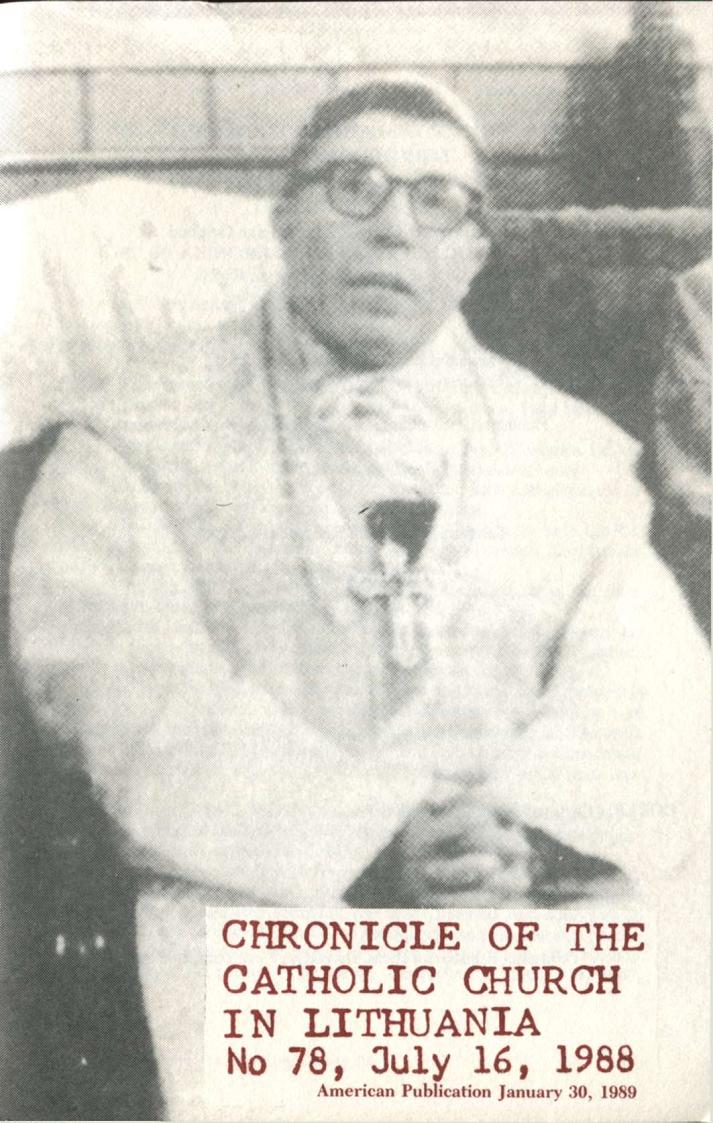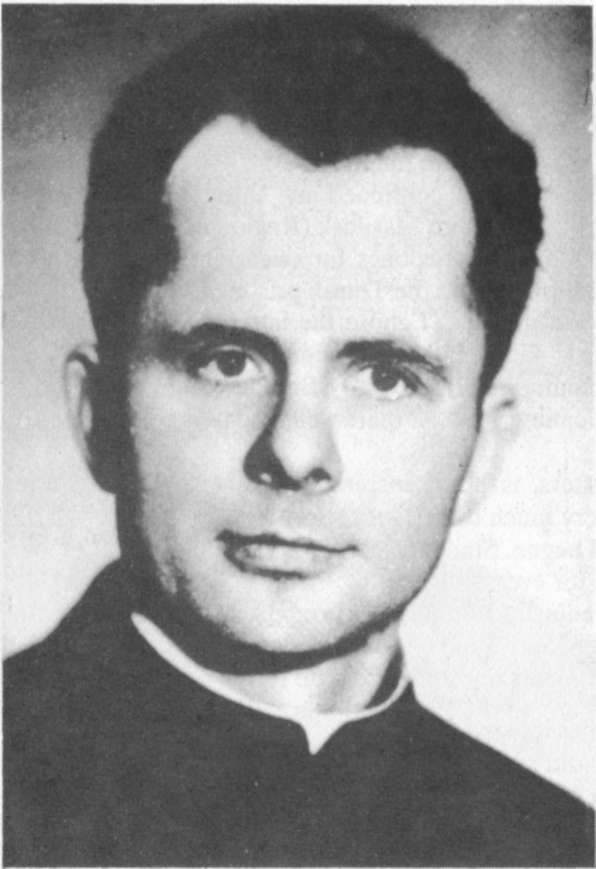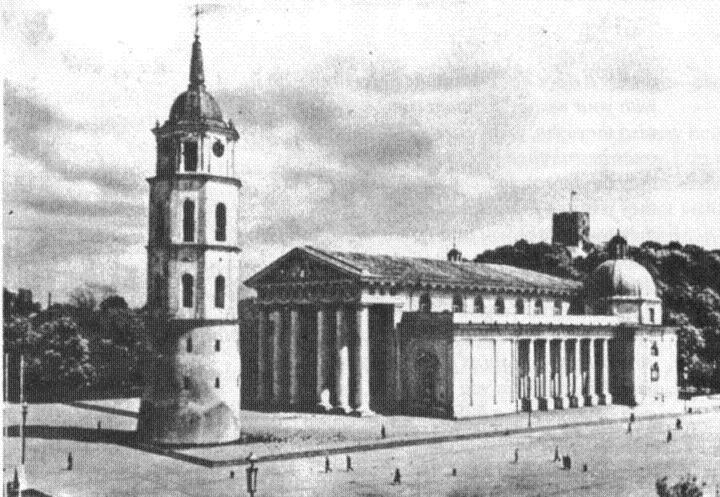
Appearing since 1972
Read this and pass it on!
This issue is dedicated to Cardinal Vincentas Sladkevičius of the Catholic Church in Lithuania.
CHRONICLE OF THE CATHOLIC CHURCH IN LITHUANIA, NO. 78 
In this issue:
1.We Thank Our Holy Father, John Paul II
2.We Congratulate Cardinal Vincentas Sladkevičius
Lithuania July 16,1988
Holy Father, today it is difficult to find suitable words for Catholic Lithuania to express to you as it wishes its sincere gratitude and love for all the attention you have lavished on our tiny nation.
A fresh piece of good news has reached us that Bishop Vincentas Sladkevičius has been appointed President of the Bishops' Conference and Cardinal for Lithuania. The Cardinal's appointment is a precious gift; it is an important and meaningful event for the entire Catholic Church of Lithuania, and for the nation. We resolve to be worthy of it.
Your Esteemed Eminence, a wave of joy and thanksgiving to God rushed over our homeland, Lithuania, when we learned of your elevation and appointment as cardinal. For twenty-four years, we saw you patiently bearing the exile's lot. We watched and wondered at the work of God within you, and through you.
We have witnessed with what devotion you labored in the tiny parish of Nemunėlio Radviliškis, on the very border of Latvia, and in the parish of Paberžė, you used to plan the solemn liturgical celebration of holy days; you used to explain the word of God, solemnly, sincerely, and sensitively, just as you explain it solemnly and sincerely today to crowds of the faithful in the thousands. Your humility, simplicity, and your ascetical mode of life, has ornamented and continue to ornament your person, and force more than one of us to think and reassess our chosen values.
Understanding well that your new responsibilities are very serious and difficult, we resolve to support you by prayer and sacrifice, and in the first place, by loyalty and obedience. Through the intercession of the Blessed Virgin Mary, we pray the Most High that you would always be supported by the Divine Spirit of steadfastness, understanding and wisdom.
With respect and love, The Catholic of Lithuania
(Cardinal Vmcentas Sladkevičoius's July 12, 1988 sermon delivered at Marijampoli, celebrating the Solemnity of the Blessed Archbishop Jurgis Matulaitis.)
I have returned from a long journey. From the center of our Christianity, the Eternal City of Rome, I bring you the blessing and love of the Holy Father and for our land, the title, promotion, and honor of Cardinal.
To whom does this title, honor, and promotion belong? Not to me, my beloved, but to you, the entire Lithuanian nation. To Christian Lithuania. For her is this title of Cardinal, for her is meant this honor and distinction of Cardinal!
You are the possessors of this title and honor; I am only its bearer, carrying it in my hands and in my heart. I myself am not worthy of this noble title. You, or rather, our entire nation, by its six hundred years of Christian living, dedication, suffering, loyalty to the Holy See, its high moral life, and its beautiful Lithuanian Christian culture, has earned this honorable title, honor and distinction as Cardinal.
Now we can say that our nation is a cardinalatial nation. Saint Peter once said that you are a chosen race, a consecrated nation, a royal priesthood. If he spoke today, he would say, "You are a cardinalatial nation."
To: General Secretary of the Central Committee of the Communist
Party of the Soviet Union, Mikhail Gorbachev Copies to: Bishops of Lithuania and Administrators of Dioceses From: Priests of the Diocese of Telšiai and the Prelature of Klaipeda
A Petition
When, in 1976, the Regulations for Religious Associations were being prepared, the bishops and priests of the Catholic Church in Lithuania appealed to the Soviet government in writing, requesting that the Regulations be in conformity with Catholic Canon Law.
Unfortunately, no regard was paid to those wishes, and the Regulations ruling religious life in our country, were prepared exclusively by atheisti-cally oriented officials of the Soviet government.
Priests and faithful must abide by Canon Law. As citizens of the U.S.S.R., they must also keep Soviet law. But this is impossible, since the Constitution contradicts itself: While proclaiming the equality of all citizens, it immediately divides citizens into two classes: non-believers and believers.
Kretinga
On January 22,1988, Bronius Poškus of Žemaičių 8-58, Kretinga, was summoned before the Chief of the Kretinga Rayon KGB.
At the beginning of the interrogation, Pocevičius stated that the questions had been prepared and sent by the Procurator's Office of Vilnius. The questions concerned the Chronicle of the Catholic Church in Lithuania: Whether he read this publication, to whom he had given it and where he had obtained it, whether he had signed a ptition addressed to the Congress of the United States of America, and also to General Secretary Mikhail Gorbachev, concerning permission to commemorate February 16, when and what circumstances he had signed the aforesaid petitions and is ne acquainted with Vilnius resident Petras Cidzikas. Having acquainted Poškus with the questions which the interrogation accomplished, Pocevičius tried, in essence, to deny the interrogation in progress. In his words, it was not an interrogation or a questioning, but simply an explanation and response to questions sent by the Procurator's Office.
"How am I to understand such talk on your part?" asked the surprised subject. "I received a special summons bearing the seal and signature of a KGB agent in which it clearly says in the Lithuanian language that my appearance is mandatory, and from your words, it would appear that I came of my own free will. If this is so, then I refuse to give any kind of explanation of my own free will," Poškus said.

Father Sigitas Tamkevičius.
Father Sigitas Tamkevičius writes:
"The morning of June 21 was my first after the operation... How good it was to read words wishing me well.
"This is how I wound up in Staro Sainokov. On May 18, at 5:00 P.M., I returned as usual after work to the barracks. They summoned me to the office, fingerprinted me, and told me to bring all my things. After a search, they took me to the Vsiesviatskaya Station, and put me in a stolypin (a prisoner transport car - Trans. Note). Here I found that I was on the way to Tomsk.
"The next day, I was in the Sverdlovsk jail. I spent several days in the cell, and the night of May 22, continued my journey. Through Tuimen, Omsk, and Novosibirsk, we rolled into Mariinsk (Region of Kemerov).
Kaunas
On June 30, 1988, the Deans of the Archdiocese of Kaunas and the Diocese of Vilkaviškis were summoned to the Chancery of the Archdiocese of Kaunas for their annual meeting with the Commissioner for Religious Affairs, Petras Anilionis.
Anilionis, after announcing that this year his traditional lecture to the deans would not take place, suggested that they have a general discussion on questions of mutual concern. Anilionis himself began by explaining that cemetery memorial markers had already been ordered, if citizens so desired to inscribe religious symbols officially on grave markers, something which had been heretofor forbidden to government craftsmen; nor are government agencies forbidden to accept orders for cemetery crosses.
The Commissioner tried to convince the deans that it is now very easy and proper to deed parish structures — rectories erected in the priests' name -- to the state, which commits itself to rent them to ministers of the Church.
To the question whether restructuring would effect Church-state relations: specifically whether Fathers Alfonsas Svarinskas and Sigitas Tamkevičius

The Cathedral of Vilnius as an art gallery.
would remain in prison, Anilionis replied that this question is under consideration, but that a whole list of responsible officials is still against the release of these priests. "You must understand that just as you have your extremists, we have in our midst atheist extremists, with whom it is also not easy to reason," the Commissioner apologized.
The Commemoration of the Millenium of the the Baptism of the Kievan Rus'
In 988, Prince Vladimir of Kiev received baptism in the Eastern Rite from Constantinople and Kievan Rusia, from the viewpoint of the Church, became directly dependent on the Patriarch of Constantinople. When, in 1054, Patriarch Cerularius split with Rome, Kievan Rusia did not break off ties right away with the Successor of Peter in Rome.
As late as 1458, Metropolitan Grigori of Kiev received ordination as a bishop in Rome. It was much later that orthodoxy began to spread among the Christians of Kievan Rusia, especially with the rise of Moscow and its attempt to keep the inhabitants of the Russian lands within the Grand Duchy of Lithuania at least in its ecclesiatical jurisdiction.





